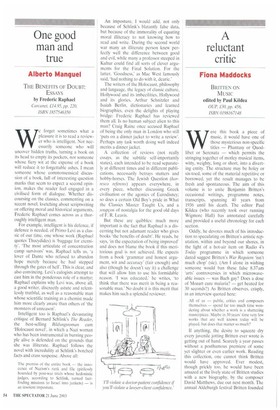One good man and true
Alberto Manguel
THE BENEFITS OF DOUBT: ESSAYS by Frederic Raphael Carcanet, £14.95, pp. 220, ISBN 1857546350 We forget sometimes what a pleasure it is to read a reviewer who is intelligent. Not necessarily someone who will uncover hidden truths, turning a book on its head to empty its pockets, nor someone whose fiery wit at the expense of a book will reduce it to forgettable ashes. I mean someone whose commonsensical discussion of a book, full of interesting question marks that seem to expect a second opinion, makes the reader feel engaged in a civilised form of dialogue. Whether discoursing on the classics, commenting on a recent novel, lcvetching about scriptwriting or offering moral and historical arguments. Frederic Raphael comes across as a thoroughly intelligent man.
For example, intelligent is his defence, if defence is needed, of Primo Levi as a classic of our time, one whose work (Raphael quotes Thucydides) is 'baggage for eternity'. The most articulate of concentration camp survivors' was, Raphael tells us, 'a lover of Dante who refused to abandon hope merely because he had stepped through the gates of hell'. This is clear, and also convincing. Levi's eulogists attempt to cast him in the ponderous role of a martyr; Raphael explains why Levi was, above all, a good writer, discreetly astute and relentlessly truthful, as well as a reasonable man whose scientific training as a chemist made him more clearly aware than others of the monsters of unreason'.
Intelligent too is Raphael's devastating critique of Bernard Schlink's The Reader, the best-selling Bildungsroman cum 'Holocaust novel', in which a Nazi woman who has been instrumental in burning people alive is defended on the grounds that she was illiterate. Raphael follows the novel with incredulity at Schlink's botched facts and crass suspense. Above all:
The premiss of the entire hook — the innocence of Nazism's rank and file (pitilessly hounded by post-war trials whose hedonistic judges, according to Schlink, turned factfinding missions to Israel into junkets) — is an insolent imposture.
An imposture, I would add, not only because of Schlink's blatantly false data, but because of the immorality of equating moral illiteracy to not knowing how to read and write. During the second world war many an illiterate person knew perfectly well the difference between good and evil, while many a professor steeped in Kultur could find all sorts of clever arguments for the Final Solution. For the latter, 'Goodness,' as Mae West famously said, 'had nothing to do with it, dearie.'
The writers of the Holocaust, philosophy and language, the legacy of classic culture, Hollywood and its imbecilities, Hollywood and its glories, Arthur Schnitzler and Isaiah Berlin, dictionaries and learned biographies, even the delights of playing bridge: Frederic Raphael has reviewed them all. Is no human subject alien to this man? Craig Raine once accused Raphael of being the only man in London who still 'puts on a dinner jacket to write a review. Perhaps any task worth doing well indeed merits a dinner jacket.
A collection of reviews (not really essays, as the subtitle self-importantly states), each intended to be read separately at different times and in different publications, necessarily betrays stutters and hobby-horses. The Jewish Question (horresco referens) appears everywhere, in every piece, whether discussing Greek civilisation or the agonies of Eurodisney; so does a certain Old Boy's pride in What the Classics Master Taught Us, and a soupcon of nostalgia for the good old days of F. R. Leavis.
But these are quibbles: much more important is the fact that Raphael is a discerning but not adamant reader who gives books 'the benefits of doubt'. He reads, he says, 'in the expectation of being improved' and does not blame the book if this meritorious goal is not achieved. He expects from a book 'grammar and honest argument, wit and accuracy' (fair enough) and also (though he doesn't say it) a challenge that will allow him to use his formidable reason. 'I was educated.' he writes, 'to think that there was merit in being a reasonable man.' No doubt it is this merit that makes him such a splendid reviewer.


































































































 Previous page
Previous page